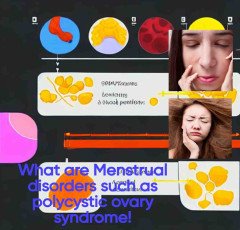
What is Fertility and infertility ?

The term "fertility" refers to a person's inherent capacity to bear children.
Fertility in women is often referred to as the capacity to conceive and carry a pregnancy to term. The ability to create healthy sperm that can fertilize an egg is often how males are characterized as being fertile.
Contrarily, infertility describes the inability to produce a child while trying for at least a year.
Hormonal imbalances, physical issues with the reproductive system, or lifestyle choices like smoking or binge drinking alcohol are just a few of the causes of infertility. Men and women can also experience infertility, which is thought to impact 10-15% of couples globally.
There are two categories for infertility: primary and secondary.
Primary infertility is defined as the inability to conceive after a year of trying, whereas secondary infertility is defined as the inability to conceive after giving birth.
Infertility can occasionally be treated with medical procedures such fertility medications, intrauterine insemination, or in vitro fertilization (IVF).
In some situations, making lifestyle changes like quitting smoking, maintaining a healthy weight, and consuming less alcohol can help increase fertility.
The optimal course of action for treating infertility can be complicated and have a number of underlying causes, therefore consulting a healthcare expert is frequently important.
Infertility can also be significantly influenced by old age. Due to a fall in egg quantity and
quality as women age, their fertility declines. Age-related declines in men's fertility are also possible, albeit often less dramatic than in women.
Several medical problems, including as polycystic ovarian syndrome (PCOS), endometriosis, and some STIs, might have an impact on fertility. Conception challenges may result from these disorders' effects on the reproductive system and hormonal balance.
For couples attempting to conceive, infertility can be a stressful and emotionally taxing process.
It's critical for couples to ask for help from family members or, if necessary, a mental health professional.
Infertility is the inability to conceive after at least a year of trying.
Fertility is the natural ability to conceive and bear children. There are numerous underlying causes of infertility, and improving fertility may need medical interventions or lifestyle modifications. Additionally, aging and other issues may impact fertility.
Both men and women may be more susceptible to infertility due to a number of other reasons. These elements consist of:
Age:
As was previously noted, women's fertility decreases as they become older, with a more noticeable fall beginning in their late 30s and early 40s.
Obesity:
Being fat or overweight can influence fertility by resulting in hormonal imbalances and other health issues that can prevent conception.
Smoking:
Both men and women who smoke may have reproductive system harm and decreased fertility.
Heavy drinking and drug use:
These vices can also disrupt conception and cause other health issues that can affect fertility.
Environmental poisons:
Lead and pesticides are two examples of environmental toxins that can have an impact on fertility.
Certain medical illnesses:
Affecting fertility are conditions like diabetes, thyroid issues, and autoimmune disorders.
In order to increase the likelihood of becoming pregnant, it's critical to address these risk factors whenever possible.
To address these risk factors, it may occasionally be essential to receive medical attention or modify one's lifestyle.
Complex problems like fertility and infertility can have a wide range of reasons. Couples dealing with infertility should seek the counsel of a medical expert, and there are numerous services out there to support people and couples through the process.
It's also critical to remember that infertility can negatively affect mental and emotional wellness. Relationships and people might suffer as a result of the stress and frustration of unsuccessful infertility attempts. Couples dealing with infertility frequently experience sadness, anxiety, or depression.
It's crucial that people and couples get emotional support at this time for this reason.
This can take the shape of counseling, support groups, or talking to close friends and family who are compassionate and understanding.
Fertility treatments can be intellectually and emotionally taxing.
IVF is one treatment that can be both physically and emotionally taxing. If the treatment is unsuccessful, couples could suffer disappointment, anxiety, and even guilt.
The need for people and couples to be emotionally ready for infertility and fertility therapies.
It can be less intimidating if you set reasonable expectations and ask for help.
Complex problems like fertility and infertility can have many different causes and risk factors.
The likelihood of conception can be increased by consulting a healthcare practitioner for advice and, whenever practical, reducing risk factors.
For those going through infertility, both individually and as a pair, emotional support is crucial.
It's important to remember that individuals and couples who are unable to conceive naturally have a variety of options as well. Among these choices are:
Adoption:
By adopting a child, individuals and couples can become parents and provide a needy kid a loving home.
Donated sperm or eggs:
Individuals or couples who are unable to conceive naturally may choose to use donated sperm or eggs.
Utilizing a surrogate mother to carry a pregnancy to term on behalf of people or couples who are unable to carry a pregnancy themselves is known as surrogacy.
Treatments for infertility:
As previously mentioned, medical therapies including fertility medications, IUI, and IVF can be successful in treating infertility.
So that both individuals and couples can consider their options and choose what is best for them.
It's crucial to have a complete awareness of the advantages and disadvantages of each alternative because each one has its own set of difficulties and factors to take into account.
For people and couples who are unable to conceive naturally, there are several solutions available.
Investigate your possibilities carefully and base your choices on your unique situation and preferences. A healthcare professional's guidance and emotional support might help make the procedure less daunting.
Individuals' and couples' general health and well-being can be significantly impacted by infertility.
According to studies, infertility can lead to higher levels of stress, anxiety, and depression as well as lower levels of self-worth and a lower quality of life.
Relationships may be impacted by infertility.
Even the greatest relationships can become strained by the stress and frustration of infertility treatment, and it's normal for
couples to struggle with communication and mutual support.
Because of this, it's critical for both individuals and couples to give their mental and emotional health top priority while trying to conceive.
This can entail going to counseling or therapy, participating in support groups, taking care of oneself, and having open and honest conversations with partners.
Complex difficulties like conception and infertility can have a big impact on every element of a person's life.
Individuals and couples can manage this difficult process by seeking support, making educated decisions, and giving priority to their mental and emotional well-being.
It's important to keep in mind that everyone's experience with infertility is unique, and there is no one "right" way to handle it.
Some people could decide to seek fertility treatments, while others might decide to look into other options for parenthood or decide to put off having children.
Individuals and couples should base their selections on their unique needs, principles, and interests.
This may entail chatting with loved ones, getting advice from healthcare specialists, and pausing to consider one's own objectives and ambitions.
To be aware that discussing infertility with others can be challenging because it is a touchy subject.
Individuals and couples may find it beneficial to engage with a mental health expert who specializes in this field or to seek out support from those who have experienced infertility.
Infertility can be a difficult and complicated experience that calls for assistance, direction, and compassion. Individuals and couples can manage this experience in a way that is authentic and true to their own beliefs and aspirations by getting support and giving mental and emotional health a high priority.
The influence of lifestyle variables on fertility is a crucial part of infertility to take into account.
Both men and women's fertility can be impacted by lifestyle factors like smoking, binge drinking, drug usage, being overweight or underweight, and excessive alcohol or drug use.
Age should be taken into account while determining a woman's fertility.
Age-related changes in a woman's egg supply and quality make conception more challenging. Due of this, women who are thinking about starting a family may wish to talk with their doctor about their options and the possible hazards of delaying conception.
To be aware that some medical disorders and therapies may have an impact on fertility.
Women's fertility can be affected by a variety of conditions, including thyroid disorders, endometriosis, and polycystic ovarian syndrome (PCOS).
Similarly, fertility in both men and women can be impacted by cancer therapies like chemotherapy and radiation.
Working with a healthcare professional who specializes in this field is crucial for people and couples who are experiencing infertility.
A fertility specialist can assist in determining any underlying reasons for infertility and create a custom treatment plan based on each patient's particular requirements and circumstances.
Both male and female fertility can be impacted by lifestyle choices, aging, and medical issues.
The likelihood of conception can be increased by consulting a healthcare professional for advice and, whenever practical, removing any risk factors.
Always keep in mind that 1 in 8 couples globally are thought to encounter infertility.
Although it can be a challenging and emotional process, many individuals and couples are able to conceive and start the families they want with the correct help and supports. It's also critical to understand that battling with infertility or seeking assistance is not shameful.
The need for medical care for infertility is no different from the need for care for any other medical illness because infertility is a medical problem.
Complex concerns like fertility and infertility can have a negative effect on a person's mental, emotional, and social health.
Individuals and couples can negotiate this journey with more resilience and hope by getting help, making thoughtful decisions, and giving priority to their mental and emotional health.
Yes, and it's vital to remember that those battling with infertility have a wide range of options at their disposal.
These alternatives can include adopting a different lifestyle, getting pregnant through surrogacy or adoption, or using reproductive treatments.
There are various choices accessible for couples who are thinking about fertility treatments, including:
Ovulation-stimulating drugs:
Women who experience irregular ovulation or who do not ovulate at all may benefit from ovulation-stimulating drugs.
Intrauterine insemination (IUI):
This procedure increases the likelihood of conception by injecting sperm directly into the uterus during ovulation.
In vitro fertilization (IVF):
Eggs and sperm are combined in a lab dish during in vitro fertilization (IVF), and the resulting embryos are then placed in the uterus.
Intracytoplasmic sperm injection (ICSI):
In order to maximize the likelihood of conception, a single sperm is directly injected into an egg in a procedure known as intracytoplasmic sperm injection, or ICSI.
For couples to consult with their doctor frequently to choose the best course of action for their own requirements and circumstances.
For people and couples who are unable to conceive naturally or through fertility treatments, alternative parenting routes like adoption or surrogacy can also be viable possibilities.
The most crucial thing is that people and couples take the time to carefully weigh their options and make decisions that
are in line with their own values, circumstances, and ambitions.
For individuals and couples to thoughtfully weigh their alternatives and make choices that are consistent with their own values and objectives.
Another choice that some couples might think about is surrogacy. For the benefit of the intended parents, a gestational carrier is used to carry a pregnancy to term. Working with a reputable surrogacy service and thoroughly considering the moral and legal ramifications of surrogacy are essential for couples because surrogacy may be a complicated procedure.
The choice to pursue fertility treatments, adoption, surrogacy, or other parenting options is ultimately very personal and should be based on unique circumstances, values, and priorities. Individuals and couples should take the time to consider all of their options, reach out for help, and make decisions that seem right to them.
Individuals and couples should take the time necessary to consider all of their alternatives and come to a conclusion that feels right for them.
It's also important to keep in mind that, regardless of the route used, becoming a parent can be emotionally taxing. An individual's mental health and wellbeing may suffer as a result of infertility and the related therapies and decisions. The assistance of family members, medical staff, and mental health specialists can be quite helpful in navigating this situation.
Individuals and couples dealing with infertility can find a variety of resources, such as support groups, counseling services, and internet communities. It's critical that people understand they are not experiencing this alone and that there is support accessible.















 NordPass
NordPass  Unlimited access to classes on illustration, photography, design, film, music
Unlimited access to classes on illustration, photography, design, film, music  TitTok Revolution
TitTok Revolution  SOFAS
SOFAS  One World Collection
One World Collection  Sennheiser
Sennheiser  Acer Laptop
Acer Laptop  Favorite Company (Cuelinks)
Favorite Company (Cuelinks)  The Secret Email System
The Secret Email System  Hello Theme
Hello Theme  RPM 3.0
RPM 3.0  Only For The United States
Only For The United States  Best Selling Books
Best Selling Books  Online Marketing
Online Marketing  ELECTRONIC ACCESSORIES
ELECTRONIC ACCESSORIES  Unreal Engine 5 For Beginners Learn The Basics Of Virtual Production
Unreal Engine 5 For Beginners Learn The Basics Of Virtual Production  Best Home Appliances
Best Home Appliances  Creative Brief For Video Shoot
Creative Brief For Video Shoot  Men Clothing
Men Clothing  Best Sellers On Amazon
Best Sellers On Amazon  Women Fashion
Women Fashion  ASUS Laptop
ASUS Laptop  Online Technology Classes
Online Technology Classes  Top Rated From Amazon
Top Rated From Amazon  NordVPN
NordVPN  Smart Doorbell
Smart Doorbell  Hot Bags For Pain Relief
Hot Bags For Pain Relief  All Wireless Products
All Wireless Products  Artificial Intelligence
Artificial Intelligence  1150+Trendy kids coloring pages Bundle
1150+Trendy kids coloring pages Bundle  SEO Checklist
SEO Checklist  Graphics & Design
Graphics & Design  NordLocker
NordLocker  The Click Engine
The Click Engine  ASPINAL LONDON
ASPINAL LONDON  BEST SELLER TOP10
BEST SELLER TOP10  Amazon Best Selling Products
Amazon Best Selling Products  Best Robotic Vacuum Cleaners
Best Robotic Vacuum Cleaners 
















